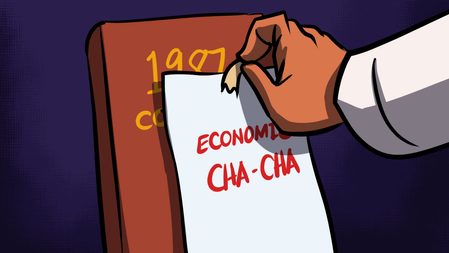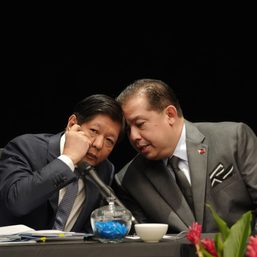SUMMARY
This is AI generated summarization, which may have errors. For context, always refer to the full article.
![[In This Economy] Too much hand-waving in the economic charter change debates](https://www.rappler.com/tachyon/2024/03/TL-hand-waving-charter-change-mar-1-2024.jpg)
I join my economist colleagues using the term “hand-waving” to describe the current discussions about charter change.
Too many people are joining the discussions without bringing to the table convincing evidence that economic charter change is the solution to the dearth of investments (and other economic woes).
Even economists are hard-pressed, because the literature out there has focused on correlations, not causation, which we know from Statistics 101 are not at all the same.
You see, economists these days put a premium on so-called causal inference: to what extent does X cause Y? Can the effect of X on Y be isolated and quantified?
Applying that to our discussion, exactly how many investments are deterred by restrictions on foreign ownership as found in the 1987 Constitution? I’m afraid that the evidence is simply absent.
Senate debates
In a Senate hearing, for instance, National Scientist Raul Fabella, my colleague at the UP School of Economics, says there is an “anti-investment ecology” in the country and that economic charter change can “reverse the march to the bottom in the investment ladder.”
But the term “anti-investment ecology” itself suggests that there’s a broad set of factors hampering investments, including red tape and corruption, not just the constitution’s restrictions.
Fabella also cited the low investment and saving rate of the Philippines vis-à-vis neighboring Asian countries. In our country, for example, savings were just 22% of total income in 2022; in Vietnam, it’s 33%, and in Indonesia it’s 37%.
But to what extent can the low saving rate be attributed to the constitutional restrictions? That cannot be answered merely by citing descriptive statistics. For all we now, the other important factors in the “anti-investment ecology” – like red tape and corruption – may be driving this correlation.
During a Senate hearing, Fabella also cited the controversy with Terminal 3 of the Ninoy Aquino International Airport. Because a foreign firm could not operate it, the firm had to find a local partner first.
The problem, said Fabella, is that “the partner was embroiled in corruption cases leading to lawsuits that caused the completed Terminal 3 to be mothballed for a decade since delivery in 2002.” It was only in 2014, more than a decade later, that NAIA 3 became fully operational.
Sure, this is an interesting case study. But again, by itself, it does not say that constitutional restrictions are a significant barrier to foreign investments.
After all, there was in fact a wave of foreign investments that came into the country in the early 2010s (see graph below). That happened even without charter change.
House debates
Recently, the House of Representatives itself embarked on its own hearings, bringing in experts and also the analysis of in-house economists of the Congressional Policy and Budget Research Department (CPBRD).
The CPBRD team found that if you control for many variables that could possibly affect foreign investments, “reforms leading to a 10% reduction in the level of foreign equity restrictions…could potentially increase FDI by around 7.7% on average.”
But again, regression analyses like these are just fancier correlations and not exactly causal studies.
Moreover, if you parse their analysis, there are other variables that could have a greater statistical association with FDI, including reducing taxes, increasing the amount of human capital (like education and training), and reducing corruption. (By comparison, reducing the foreign restrictions has a smaller impact in comparison to these other determinants.)
While generally in support of economic charter change, even the House economists admitted that “easing restrictions on foreign ownership alone may not eliminate all barriers to Philippine economic competitiveness,” and “policymakers and investors should consider a range of other factors that can either attract or deter foreign investments.”
Marikina Representative Stella Quimbo, meanwhile, in the second day of the House hearings, juxtaposed the House staff economists’ graphs showing that least restrictive sectors (like manufacturing and financial and insurance services) get a larger share of the investment pie.
But this again confuses correlation and causation. The FDI restrictiveness index of the Organization for Economic Co-operation and Development (OECD) includes not just constitutional restrictions but also other factors, namely: “foreign equity restrictions, discriminatory foreign investment screening and approval requirements, restrictions on the employment of foreign key personnel, and other operational restrictions (such as limits on purchase of land or on repatriation of profits and capital).”
Moreover, it’s unfair to use the OECD’s restrictiveness data (dated 2020) which cannot possibly reflect the effects of the recently passed liberalization efforts (including the 2022 amendments to the Public Service Act, as well as the 2021 Retail Trade Liberalization Act).
Representative Quimbo accused IBON Foundation of “cherry-picking” the data. But she should be wary of doing it, too. We need to base our analysis on updated data, and not stick to old data that may no longer reflect current realities.
One of the other resource persons, Dr. Hazel Parcon-Santos of the Bangko Sentral ng Pilipinas, provided a voice of reason. She said that amending the constitution is not a “silver bullet” to our investment woes, and more studies need to be done on the sectors that economic charter change aims to liberalize.
Moving forward, we need better data and more nuanced debates for something as large and consequential as economic charter change.
On the part of Filipino economists, this presents a challenge to do proper causal studies on FDI inflows. Correlation studies just won’t cut it. Of course, causal studies are no mean feat. But there are tools in the economist’s arsenal to do them.
On the part of everyone participating in the economic charter change debate, this is also an invitation to exercise caution in making claims that economic charter change is a surefire way of boosting the economy.
Otherwise, unfounded claims may gain credence and easily make their way into mainstream discussions, or even propaganda. For instance, some political blogs and posts have already cherry-picked Fabella’s recent statements to advance their own messages.
Worse, we might go the way of other ill-thought policies, like the Maharlika Investment Fund which was blindly passed by Congress using a plethora of woolly economic arguments and hand-waving.
The difference, of course, is that with economic charter change the stakes and risks are much, much higher. – Rappler.com
JC Punongbayan, PhD is an assistant professor at the UP School of Economics and the author of False Nostalgia: The Marcos “Golden Age” Myths and How to Debunk Them. JC’s views are independent of his affiliations. Follow him on Twitter (@jcpunongbayan) and Usapang Econ Podcast.
1 comment
How does this make you feel?






![[EDITORIAL] Apat na taon na lang Ginoong Marcos, ‘di na puwede ang papetiks-petiks](https://www.rappler.com/tachyon/2024/07/animated-bongbong-marcos-2024-sona-day-carousel.jpg?resize=257%2C257&crop=280px%2C0px%2C720px%2C720px)
![[In This Economy] Delulunomics: Kailan magiging upper-middle income country ang Pilipinas?](https://www.rappler.com/tachyon/2024/07/in-this-economy-upper-middle-income-country.jpg?resize=257%2C257&crop=421px%2C0px%2C1080px%2C1080px)

![[EDITORIAL] Marcos Year 2: Hilong-talilong](https://www.rappler.com/tachyon/2024/07/animated-bongbong-marcos-2nd-sona-carousel.jpg?resize=257%2C257&crop=136px%2C0px%2C720px%2C720px)
![[Newspoint] A fighting presence](https://www.rappler.com/tachyon/2024/07/thought-leaders-a-fighting-presence.jpg?resize=257%2C257&crop=441px%2C0px%2C1080px%2C1080px)



![[WATCH] Bamban POGO scandal: There’s a bigger fish than Alice Guo](https://www.rappler.com/tachyon/2024/07/inside-track-tcard-bamban-pogo.jpg?resize=257%2C257&crop=435px%2C0px%2C1080px%2C1080px)
The Filipino People are not concerned about correlation and causation but about whatever food they have on their table and the job that brought them the money to buy them. Those tools, including “cherry picking” (or how about “mango picking”?), appeal to those glued to social media but without the exercise of critical thinking. Using the Marcos Government’s Triumvirate’s Corruption-Repression-Disinformation three-headed dragon, it will surely get what it wants. Government economists should toe the government’s line because, as one incident has shown, the exit door easily opens for those who do not.